《人类减贫的中国实践》白皮书(双语全文)
新华网 2021-04-06 14:28

四、为人类减贫探索新的路径
IV. Exploring a New Path of Poverty Alleviation
消除贫困是全球性难题。各国国情不同、所处发展阶段不同,减贫标准、方式方法、路径手段也不同。中国减贫立足本国国情,深刻把握中国贫困特点和贫困治理规律,坚持中国共产党的领导,坚持以人民为中心的发展思想,坚持发挥中国社会主义制度集中力量办大事的政治优势,坚持精准扶贫方略,坚持调动广大贫困群众积极性、主动性、创造性,坚持弘扬和衷共济、团结互助美德,坚持求真务实、较真碰硬,走出了一条中国特色减贫道路,形成了中国特色反贫困理论。中国在减贫实践中探索形成的宝贵经验,既属于中国也属于世界,拓展了人类反贫困思路,为人类减贫探索了新的路径。
Eliminating poverty is a challenge for all countries. Each subject to different national conditions and at different stages of development, they adopt different poverty reduction criteria, methods and approaches. Bearing in mind its prevailing reality and understanding the nature of poverty and the status of poverty alleviation, China has embarked on a path of poverty alleviation and designed an approach with Chinese characteristics. In this battle, the nation has upheld the CPC leadership and the people-centered philosophy. It has taken advantage of one of the strengths of its socialist system – the ability to pool resources on major endeavors. It has adopted targeted measures and stimulated the enthusiasm, initiative, and creativity of the people in poverty. It has carried forward the great tradition of working together and offering mutual support, and it has adopted a down-to-earth and pragmatic style of work. In this approach, China has accumulated valuable experience, which belongs both to China itself and to the rest of the world, and offers enlightenment to the international community in its battle to reduce poverty.
(一)坚持以人民为中心
1. People-centered Philosophy
中国共产党是有远大抱负的政党。中国共产党的奋斗目标,既很宏伟也很朴素,归根结底是让全体人民过上好日子。100年来,不管国际国内形势如何变化,中国共产党始终把人民放在心中最高位置,始终坚守为人民谋幸福、为民族谋复兴的初心使命,以坚定不移的信念和意志,团结带领人民与贫困作斗争。进入新时代,中国共产党坚持以人民为中心的发展思想,采取一系列超常规政策举措推进脱贫攻坚,努力让贫困群众有更好的收入、更好的教育、更好的医疗卫生服务、更好的居住条件。把群众满意度作为衡量脱贫成效的重要尺度,集中力量解决贫困群众基本民生需求,宁可少上几个大项目,也要优先保障脱贫攻坚资金投入;宁可牺牲一些当前利益、局部利益,也要服从和服务于减贫工作大局;宁可经济增速慢一些,也要确保脱贫攻坚目标任务如期完成。在脱贫攻坚没有硝烟的战场上,广大党员、干部以热血赴使命、以行动践诺言,用自己的辛劳换来贫困群众的幸福。驻村第一书记和工作队员扎根一线、任劳任怨,基层党员干部呕心沥血、苦干实干,广大志愿者真情投入、倾力奉献。他们有的长期奋战在扶贫一线,舍小家为大家,付出很大牺牲;有的为群众脱贫四处奔波,爬山涉险,不辞劳苦;有的常年加班加点,积劳成疾;有的为扶贫工作负伤,仍然带病坚持工作。脱贫攻坚以来,1800多名党员、干部为减贫事业献出了宝贵生命,用实际行动践行了为人民牺牲一切的誓言。新时代脱贫攻坚实践,深刻诠释了以人民为中心的理念,是中国共产党全心全意为人民服务的宗旨在新时代最集中、最充分、最生动的体现。
The CPC is an ambitious party with a grand but simple goal: to ensure a happy life for the Chinese people. In the face of all the changes in the international landscape and the domestic situation over the past century, the Party has always followed a people-centered philosophy. It has borne in mind its founding mission to seek happiness for the Chinese people and national rejuvenation, and united and led the people in fighting poverty armed with firm convictions and a strong will. In the new era, the CPC has adopted a series of bold policies and measures to advance the cause, trying to ensure higher incomes and better education, healthcare, and living conditions for the poor. Taking public satisfaction as an important yardstick to judge the effectiveness of poverty elimination, the Party has concentrated its efforts on guaranteeing the basic needs of the poor. It would rather cut down on the number of major projects in favor of investment in poverty elimination; it would rather penalize short-term, partial or local interests to ensure the cause is well served and guaranteed; and it would rather slow the pace of economic growth to ensure the task of poverty alleviation is accomplished on schedule.In the fight against poverty, officials including first Party secretaries and resident working teams, grassroots officials and Party members, and volunteers have worked with diligence and a spirit of dedication in support of the poor, fulfilling their mission and their pledge to the people. Some of them have been fighting on the front line for a long time, without time or energy to take care of their own families; some have been traveling around or braving harsh natural conditions; some have fallen sick from overwork all the year round; some have continued work even after getting injured at work. More than 1,800 Party members and officials have lost their lives in the cause of poverty alleviation.
中国减贫实践表明,贫困问题本质上是对人民的根本态度问题,以人民为中心是扶贫减贫的根本动力。真正把人民放在心上,真正把人民利益放在第一位,才能真正识贫、扶贫、脱贫,减贫才会有不竭动力、明确方向和好的办法。
China's poverty elimination effort in the new era is a full and vivid expression of its people-centered philosophy and the CPC's mission of serving the people wholeheartedly. Success in poverty alleviation has proven that the problem of poverty, in essence, is how the people should be treated: the people-centered philosophy is the fundamental driving force behind this cause. Only with this philosophy, can a country identify those who are poor, adopt concrete measures, and deliver genuine outcomes; only with this philosophy, can it draw on inexhaustible motivation, set a clear direction, and find the right approach.
(二)把减贫摆在治国理政突出位置
2. Highlighting Poverty Alleviation in the Governance of China
贫困地区发展条件差,贫困人口自我发展能力弱,消除贫困仅仅依靠个体、区域、民间等力量远远不够,必须作为执政党和国家的责任,上升为国家意志、国家战略、国家行动。中国共产党始终把消除贫困作为定国安邦的重要任务,制定实施一个时期党的路线方针政策、提出国家中长期发展规划建议,都把减贫作为重要内容,从国家层面部署,运用国家力量推进。几代中国共产党人,锚定一个目标,一茬接着一茬干。中共十八大以来,中国共产党把脱贫攻坚摆在治国理政的突出位置,加强党的集中统一领导,统筹谋划、强力推进。从党的领袖到广大党员干部,情系贫困群众、心怀减贫大业,全党目标一致、上下同心。加强顶层设计和战略规划,制定印发《关于打赢脱贫攻坚战的决定》《关于打赢脱贫攻坚战三年行动的指导意见》等政策文件,明确目标、路径和具体措施并一以贯之抓下去。各级财政不断加大投入力度(图4),构建多元资金投入体系(专栏12),为减贫事业发展提供资金保障。发挥社会主义制度集中力量办大事的优势,广泛动员各方力量积极参与。建立脱贫攻坚责任体系、政策体系、组织体系、投入体系、动员体系、监督体系、考核评估体系等制度体系,为脱贫攻坚顺利推进提供了有力支撑。
Poor conditions for development in impoverished areas and a lack of capacity for self-improvement among the poor population determine that poverty cannot be eliminated by relying solely on the efforts of individuals, local governments, or non-governmental forces. Poverty elimination must be taken on as a responsibility of the ruling party and the country; it requires will and action at national level, and it must be elevated to a national strategy. The CPC has always regarded poverty alleviation as an important task for ensuring national peace and stability. It has highlighted poverty alleviation at national level when setting its guidelines, principles and policies, and when formulating national plans for medium- and long-term development. The Party has pooled national resources to advance this cause and motivated generations of its members to devote themselves to this cause. Since the 18th National Congress in 2012, the CPC has prioritized poverty elimination in its governance, and planned and advanced this cause under its centralized and unified leadership. All Party members, from top leaders to the grassroots officials, are concerned about the poor and the cause of poverty alleviation, and work together towards the same goal. China has strengthened top-level design and strategic planning. It has issued policy documents such as Decision on Winning the Battle Against Extreme Poverty and Guidelines on the Three-Year Action Plan to Win the Battle Against Extreme Poverty, setting specific aims, defining approaches and detailed measures, and carrying them out with consistent efforts. Investment has been increased by governments at all levels (Figure 4) and a multiple investment system has been established (Box 12), guaranteeing financial support for poverty alleviation. Leveraging the strength of its socialist system – the ability to pool resources on major endeavors – China has mobilized forces from all quarters to participate in poverty alleviation. Systems have been established, covering responsibilities, policies, organization, inputs, mobilization, supervision, assessment and evaluation, and many other aspects of poverty elimination, providing an institutional guarantee for the nation to advance the battle against poverty.
中国减贫实践表明,治国之道,富民为始;民之贫富,国之责任。减贫是一项具有开拓性的艰巨工作,实现减贫目标,领导人的情怀、意志和决心至关重要,执政党和国家担负起对人民的责任、发挥主导作用、汇聚各方力量至关重要,保持政策的连续性和稳定性至关重要。
The success in poverty alleviation has proven that governance of a country starts with the needs of the people, and that their prosperity is the responsibility of the government. Poverty alleviation is a pioneering and arduous trek. To achieve success, it is of utmost importance that the leadership have devotion, strong will and determination, and the ruling party and government assume their responsibilities to the people, play a leading role, mobilize forces from all quarters, and ensure policies are consistent and stable.
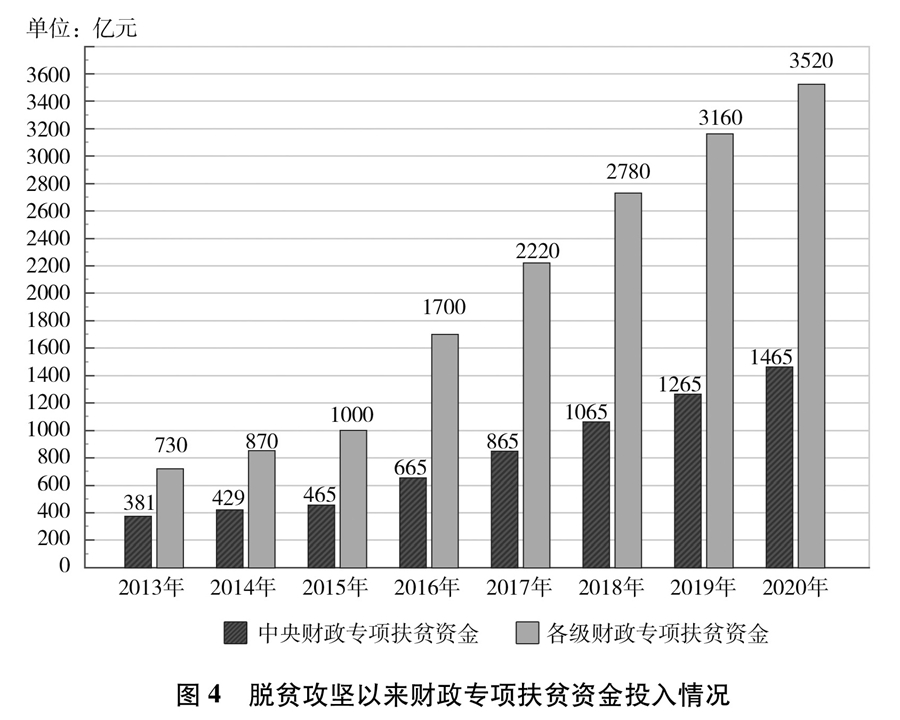
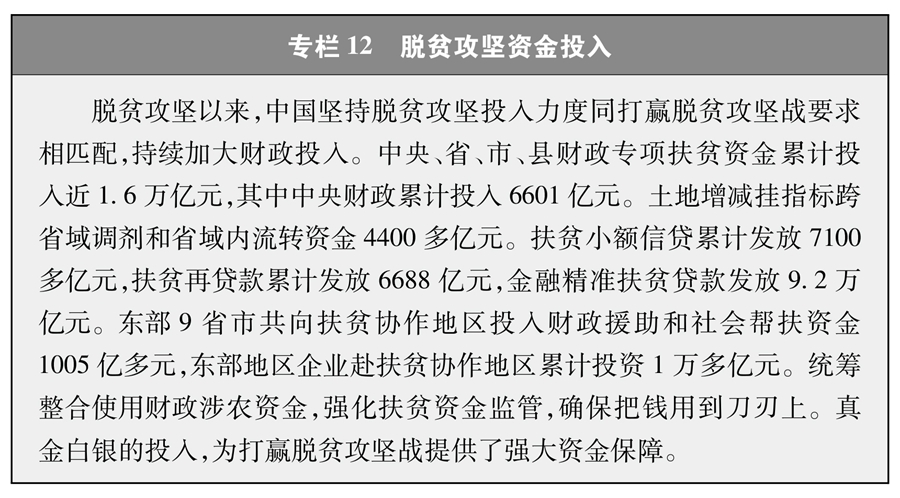
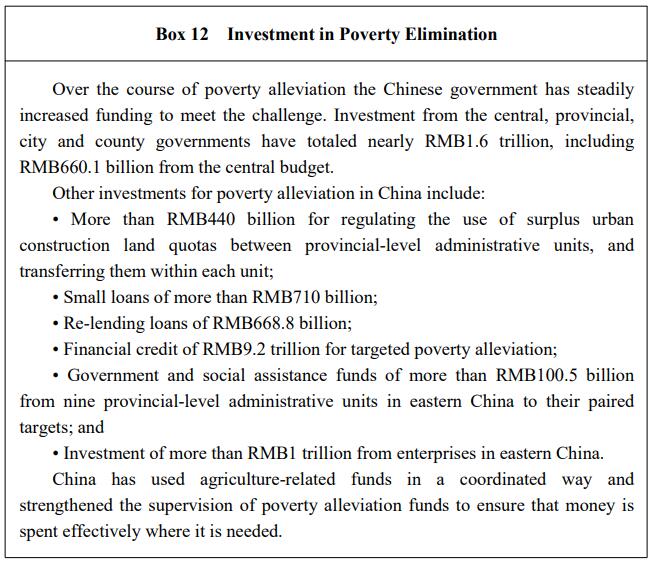
(三)用发展的办法消除贫困
3. Eradicating Poverty Through Development
贫困问题说到底是发展问题。作为拥有14亿人口、世界上最大的发展中国家,发展是解决包括贫困问题在内的中国所有问题的关键。中国共产党始终把发展作为执政兴国的第一要务,集中精力搞建设、谋发展,通过发展解决不平衡不充分问题,创造了经济快速发展奇迹和社会长期稳定奇迹。把改革作为消除贫困的重要推动力,从新中国成立后进行土地改革、建立社会主义制度,到改革开放后实行家庭联产承包责任制,到确立社会主义市场经济体制、全面免除农业税,再到中共十八大以来实行农村承包地所有权、承包权、经营权“三权分置”和推进农村集体产权制度改革,不断消除导致贫困的制度性、结构性因素,不断促进农村发展、农民增收。积极顺应全球化潮流,坚定不移扩大对外开放,对外贸易持续快速增长,为广大农村劳动力创造了大量就业岗位、拓宽了增收渠道。新中国成立以来特别是改革开放以来,中国经济社会快速发展,经济总量不断跃升,综合实力显著提升,既对减贫形成了强大的带动效应,也为大规模扶贫开发奠定了坚实基础、提供了有力保障。
The root cause of poverty is inadequate development. As the world's largest developing country with a population of 1.4 billion, China is aware that development is essential to solving many of its problems, including poverty. The CPC has always regarded this as the top priority in governing and rejuvenating the country. It has concentrated its efforts in particular on the economy, to address the problem of unbalanced and inadequate development. Through development, the economy has been growing rapidly and the country has enjoyed a long period of social stability. China has regarded reform as an important driving force for poverty eradication and worked constantly to remove institutional and structural causes of poverty:
• By launching land reform and establishing the socialist system after the founding of the PRC in 1949;
• By implementing the household contract responsibility system with remuneration linked to output after the launch of reform and opening up in 1978;
• By establishing the socialist market economy and rescinding all agricultural taxes;
• By separating the ownership rights, contracting rights, and management rights for contracted rural land and further reforming the rural collective property rights system since the 18th CPC National Congress in 2012.
These measures have contributed to rural development and increased farmers' incomes. In addition, China has opened wider to the world amidst economic globalization and seen sustained and rapid growth in its foreign trade, creating many employment opportunities and more sources of higher incomes for rural labor.
Since the founding of the PRC in 1949, and especially since the launch of reform and opening up in 1978, the country has witnessed rapid economic and social development, with the economy and national strength growing steadily. This has provided solid support for large-scale development-driven poverty alleviation effort.
中国减贫实践表明,发展是消除贫困最有效的办法、创造幸福生活最稳定的途径。唯有发展,才能为经济社会发展和民生改善提供科学路径和持久动力;唯有发展,才能更好保障人民的基本权利;唯有发展,才能不断满足人民对美好生活的热切向往。
China's experience with poverty alleviation has proven that development is the most effective way to eradicate poverty and the most reliable path towards a more prosperous life. Only development can lead to economic growth, social progress and higher living standards. Only development can better guarantee people's basic rights and meet their desire for a better life.
(四)立足实际推进减贫进程
4. Pressing Ahead with Poverty Alleviation Based on Reality
贫困问题具有多样性和复杂性,致贫原因也呈现差异性和多元性。中国立足本国国情,根据不同发展阶段和经济社会发展水平,根据贫困人口规模、分布、结构等的变化,科学制定减贫标准、目标、方略,不断创新减贫理念、方法、手段,循序渐进、持续用力、滴水穿石。新中国成立后,主要是通过社会制度变革和大规模社会主义建设减缓贫困。改革开放以来,主要是通过农村经济体制改革和经济增长带动减贫,重点采取开发式扶贫方针,引导贫困地区和贫困群众以市场为导向,调整经济结构,开发当地资源,发展商品生产,提高自我积累、自我发展能力。进入新时代,在继续坚持开发式扶贫的同时,实施精准扶贫方略,扶贫路径由“大水漫灌”转为“精准滴灌”,资源使用方式由多头分散转为统筹集中,扶贫模式由偏重“输血”转为注重“造血”,考评体系由侧重考核地区生产总值转为主要考核脱贫成效。中国根据经济社会发展和减贫事业推进的实际,逐步调整提高扶贫标准,让发展成果更多更好惠及人民群众。
Poverty problems, as well as their causes, are diverse and complex. China's poverty alleviation efforts are based on a realistic appraisal of the situation. China has set its poverty line and its poverty alleviation goals and strategies, and worked to create better ideas and methods based on its national conditions and stage of development, and on the changes in the demographics, distribution, and structure of the poor population. It has advanced this undertaking step by step and with a steady effort. Immediately after its founding in 1949, the PRC addressed the problem of poverty mainly through reform of the social system and large-scale economic development. After the launch of reform and opening up in 1978, China drove poverty alleviation mainly through rural economic reform and economic growth. It adopted development-oriented measures, guiding people in impoverished areas to increase their capacity for accumulation of wealth and endogenous development by adjusting the local economic structure, tapping into local resources, and developing production in response to market demand. In the new era, China has continued previous measures, and at the same time carried out a strategy of targeted poverty alleviation. The approach has changed from generalized broad-brush policies to targeted measures based on specific conditions. Before, resources for poverty alleviation came from multiple sources and were used by scattering them among the impoverished areas; now they are concentrated and better coordinated. The model of poverty alleviation has changed from mainly relying on external support like a blood transfusion to a more sustained effort from self-motivation. The assessment system has shifted focus from regional GDP as the main indicator to the genuine result of poverty alleviation. China has gradually lifted its poverty line based on its economic and social advances and progress in the cause of poverty alleviation to share the fruits of development with more people.
中国减贫实践表明,贫困的发生演变有其自身特点和规律,贫困治理必须从实际出发,科学研判制约减贫和发展的瓶颈因素,找准释放减贫动力的突破口,因时因势因地制宜,不断调整创新减贫的策略方略和政策工具,提高贫困治理效能。
The occurrence and evolution of poverty has its own features and trends. To achieve success in reducing poverty, a country must follow a path in line with its national conditions, identify and remove obstacles to poverty alleviation, find driving forces for this cause, and constantly adjust and reform its strategies and policies as circumstances and local conditions change.
(五)发挥贫困群众主体作用
5. Letting the Poor Play the Principal Role
贫困群众是脱贫致富的主体。扶贫减贫既要借助外力,更要激发内力,才能形成合力。中国充分尊重、积极发挥贫困群众主体作用,激发培育贫困群众内生动力,增强参与发展、共享发展、自主发展的能力,使贫困群众不仅成为减贫的受益者,也成为发展的贡献者。坚持扶贫与扶志扶智相结合,既富口袋,更富脑袋,让贫困群众既有脱贫致富的想法,又有脱贫致富的办法。依托农民夜校、新时代讲习所等,加强教育培训,提升贫困群众发展生产和务工经商的基本技能。改进扶贫方式,建立正向激励、比学赶超的有效机制,更多采用生产奖补、劳务补助、以工代赈等方式,激励贫困群众依靠劳动创造幸福。大力宣传自强不息、奋斗脱贫的先进典型,广泛开展生动活泼、形式多样的宣传教育,引导贫困群众树立“宁愿苦干、不愿苦熬”的观念,用双手改变贫困落后面貌。
Poor people are the main players in eliminating poverty. Poverty alleviation requires both external and internal forces to form a synergy. China fully respects the principal role of the poor and encourages them to play their part, inspires them with the motivation to fight poverty, and enhances their ability to participate in development, share the fruits of development, and achieve endogenous development. They benefit from success in the undertaking of poverty alleviation and at the same time contribute to development in China. China has inspired its people in poverty to strive for prosperity and provided them necessary education, so that they have the ambition to emerge from poverty and the tools to succeed. People in poverty have had better access to education opportunities, such as farmers' night schools and training workshops, to improve their skills and abilities in work and business. A significant improvement in the battle against poverty is an effective mechanism of positive incentives encouraging the poor to learn from and keep pace with each other. Through this mechanism, productive activities are rewarded and subsidized and jobs instead of grants are provided, to encourage poor people to rely on their own efforts rather than wait for external assistance. China has promoted stories of role models who escaped poverty through their hard work. It has also carried out various activities to establish the idea that "It is better to work hard than to endure poverty." The people in poverty have followed suit and eventually shaken off poverty and backwardness.
中国减贫实践表明,人民是历史的创造者、推动者,是顶天立地的真正英雄。只要坚持为了人民、依靠人民,尊重人民主体地位和首创精神,激励贫困群众自力更生、艰苦奋斗的内生动力,就一定能够战胜贫困。
The fight against poverty shows that the people are the creators and drivers of history, and the true heroes. As long as a country serves the people, relies on them, respects their principal status and pioneering spirit, and motivates the poor to rely on their own hard work, it is sure to defeat poverty.
(六)汇聚各方力量形成强大合力
6. Pooling All Resources to Create Synergy
扶贫减贫是艰巨复杂的系统工程,需要调动各方积极参与。为打赢脱贫攻坚战,中国共产党依托严密组织体系和高效运行机制,广泛有效动员和凝聚各方力量,构建政府、社会、市场协同推进,专项扶贫、行业扶贫、社会扶贫互为补充的大扶贫格局,形成跨地区、跨部门、跨单位、全社会共同参与的多元主体的社会扶贫体系。加强东西部扶贫协作和对口支援(专栏13),推动省市县各层面帮扶,促进人才、资金、技术向贫困地区流动,实现优势互补,缩小区域差距。积极开展定点扶贫,组织各级党政机关、人民团体、国有企事业单位和军队帮扶贫困县或贫困村(专栏14)。各民主党派、工商联和无党派人士充分发挥各自优势,为打赢脱贫攻坚战献智献力。积极推动各行各业发挥专业优势,开展产业扶贫、科技扶贫、教育扶贫、文化扶贫、健康扶贫、消费扶贫。广泛动员民营企业参与扶贫开发,引导市场开发能力强的主体进入资源开发潜力大的地区,实现互惠互利、共同发展(专栏15)。广泛动员社会组织、公民个人积极参与脱贫攻坚,开展扶贫公益活动。设立国家扶贫日,建立脱贫攻坚国家荣誉制度,表彰脱贫攻坚先进典型,营造了人人愿为、人人可为、人人能为的社会帮扶氛围。
Poverty alleviation is an arduous, complex, and systematic endeavor, requiring the active participation of all parties. In the fight against poverty, the CPC has mobilized and pooled all possible forces on the basis of its rigorous organizational system and efficient work mechanism. A large-scale poverty alleviation network has been established, with the government, society and the market working in coordination, and government-sponsored projects, sector-specific programs, and corporate and societal assistance supplementing each other. It is a framework with the full participation of multiple players from different regions, sectors, departments and businesses. China has strengthened collaboration and paired assistance between the eastern and western regions (Box 13) at provincial, city and county levels to encourage the flow of talent, capital, and technology to poor areas so that they can complement each other and narrow the gaps between them. Poverty alleviation assistance has been directed to designated targets. Party and government institutions, people's organizations, state-owned enterprises and public institutions, and the military have assisted poor counties or villages (Box 14).Other political parties, federations of industry and commerce and prominent individuals without party affiliation have leveraged their strengths to contribute intellectual and material support. Various industries have been encouraged to offer assistance with their professional advantages by launching sector-specific programs, providing technological support, improving education, cultural undertakings and healthcare, and boosting consumption.Private enterprises have been urged to participate in development-driven poverty alleviation. Businesses skilled in resource extraction have been encouraged to enter regions with great resource potential, which benefit both the businesses and those regions (Box 15). Social organizations and individual citizens have been mobilized to participate in poverty alleviation and related public benefit activities. China has designated a National Poverty Alleviation Day and established a national system to commend models in fighting poverty. All these measures have created an atmosphere where everyone who is interested can join in poverty alleviation.
中国减贫实践表明,只有动员和凝聚各方力量,引导全社会关爱贫困群众、关心减贫事业、投身脱贫行动,形成共同意志、共同行动,聚力攻坚克难,才能最终战胜贫困顽疾。
China's experience has proven that only when a country mobilizes all sectors of society to unite with common purpose and act in unison, can poverty be finally defeated.
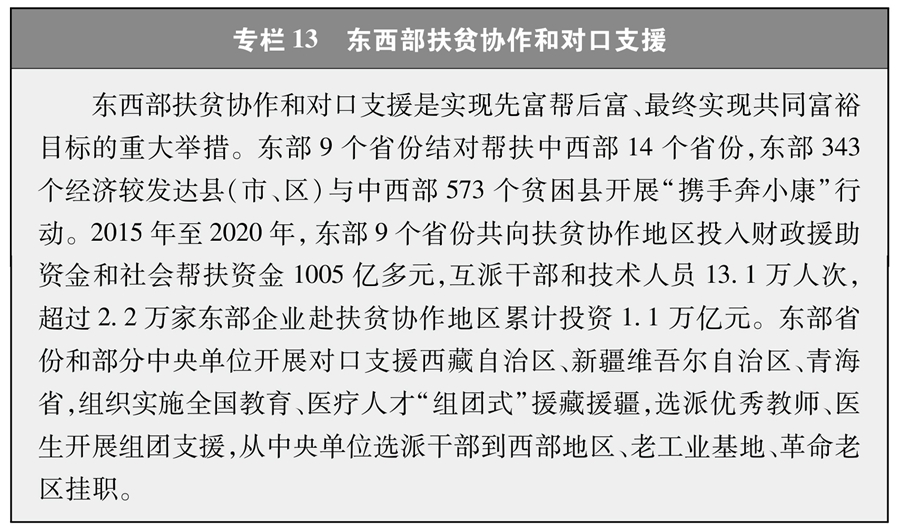
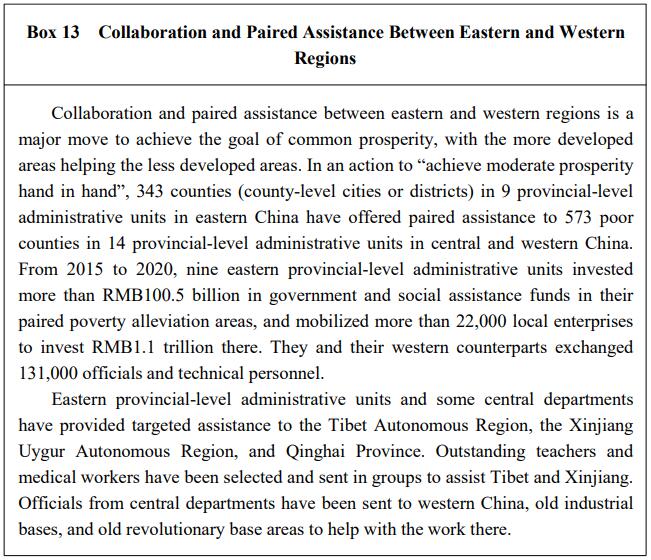
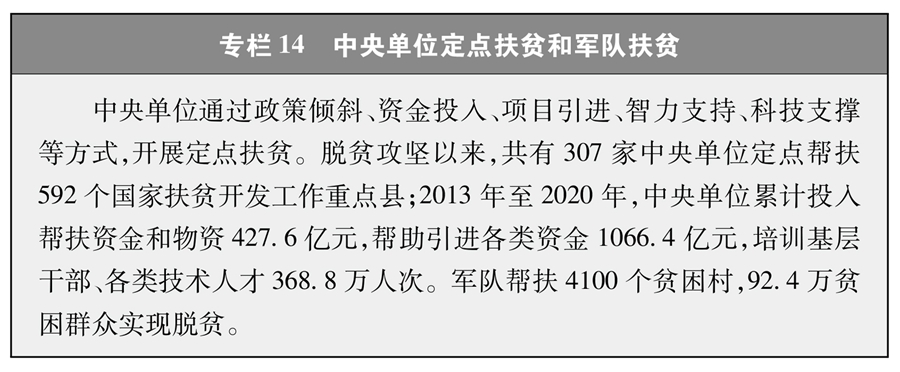
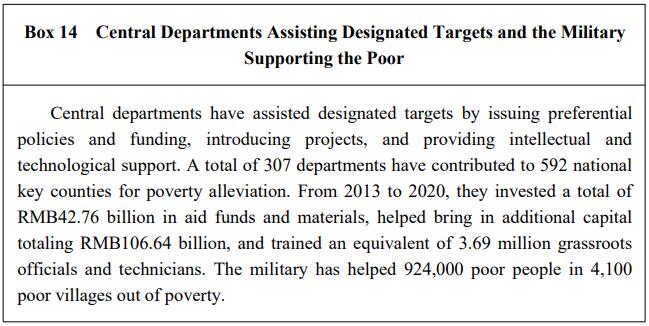
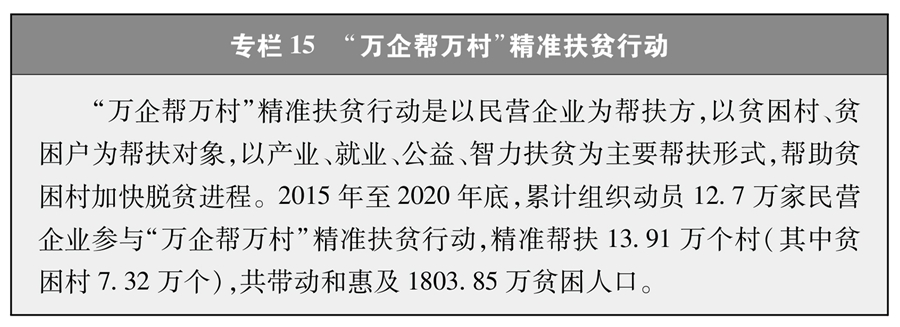
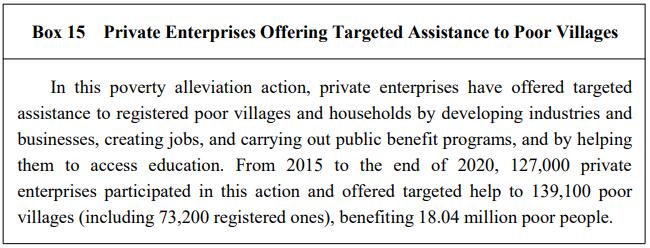
中国特色减贫道路,是中国人民在中国共产党的领导下,经过长期艰辛探索开创出来的一条成功道路。中国消除绝对贫困的成功实践和宝贵经验,深化了对人类减贫规律的认识,丰富发展了人类反贫困理论,提振了各国特别是广大发展中国家消除绝对贫困的信心,为其他国家选择适合自己的减贫发展道路提供了参考和借鉴,为破解现代国家治理难题、开辟人类社会发展更加光明的前景提供了中国方案。
Under the CPC leadership, the Chinese people have created an approach to poverty alleviation with their own hard work. China's successful practice and valuable experience in eliminating extreme poverty have deepened human understanding of poverty alleviation trends, enriched and extended the theory of international poverty alleviation, and boosted the confidence of other countries, especially developing ones, in eradicating extreme poverty. They serve as reference for other countries to choose a suitable path of poverty alleviation, and offer China's approach to solving the problem of modern national governance and creating brighter prospects for social progress.









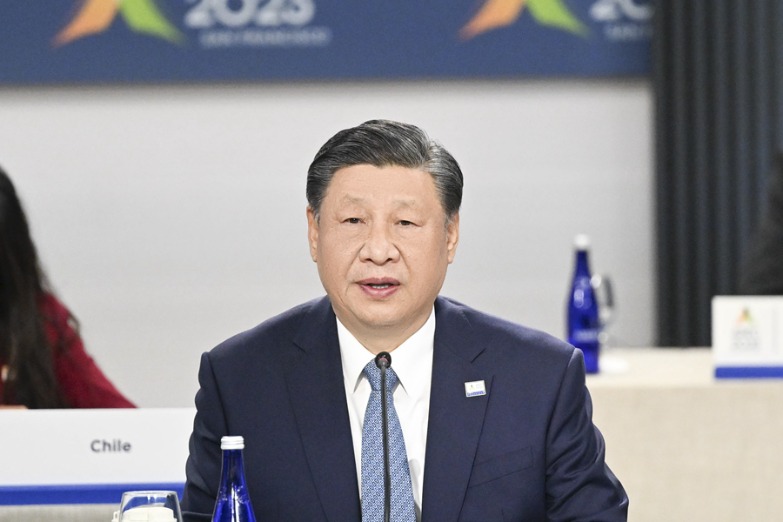
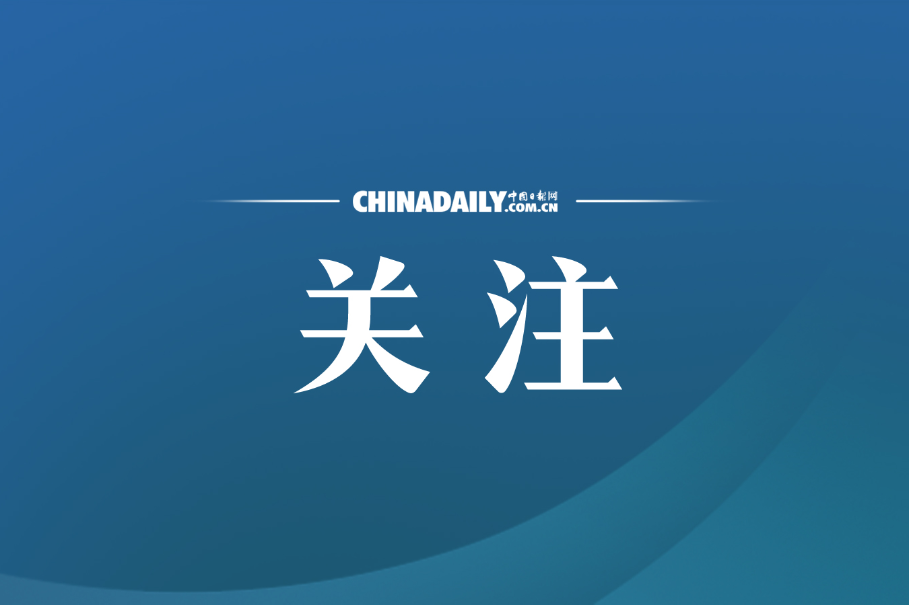
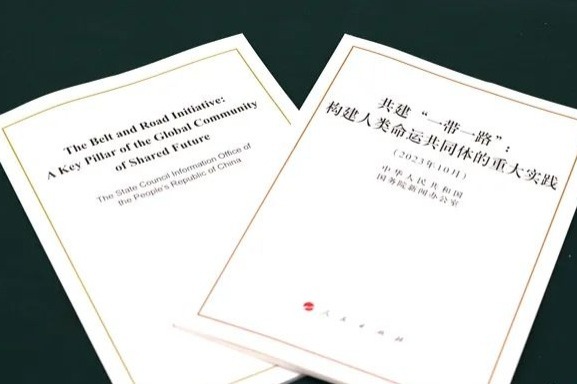
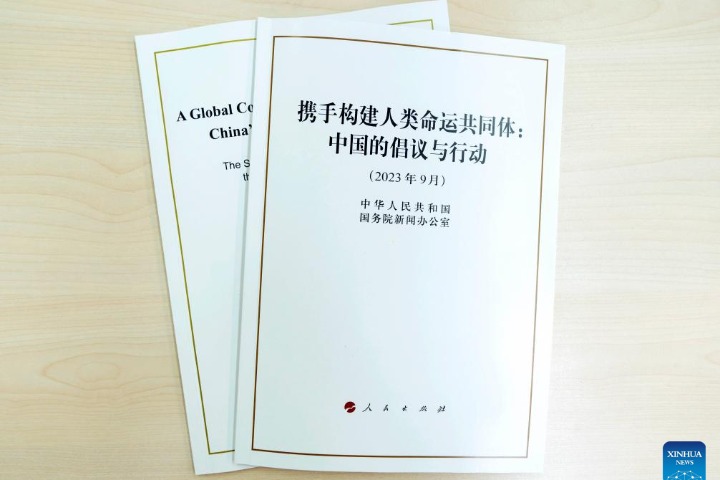
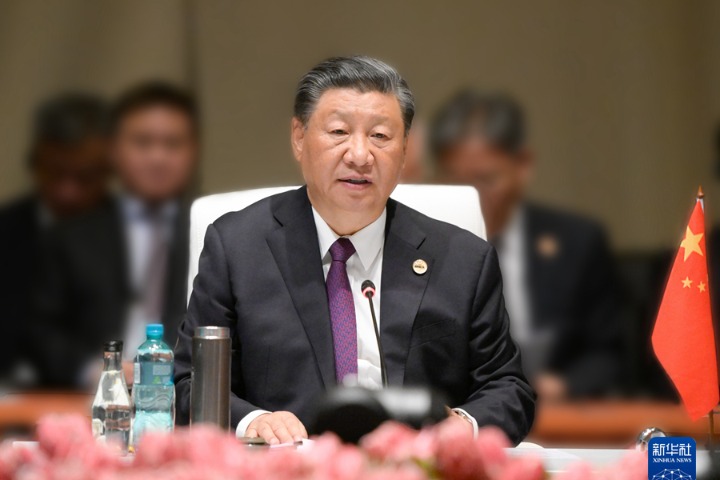



 英语点津微信
英语点津微信 双语小程序
双语小程序